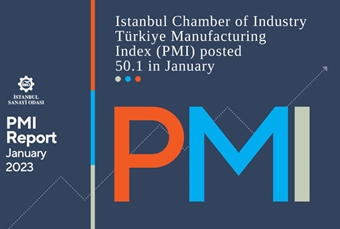ICI Türkiye Manufacturing PMI Rose to 50.1
- 01.02.2023
- News

The headline PMI of the Istanbul Chamber of Industry (ICI) Türkiye Manufacturing PMI survey, which is the fastest and reliable reference accepted in manufacturing industry performance of the economic growth, moved back above the 50.0 no-change mark in January, posting 50.1. The headline PMI signalled stability in the health of the Turkish manufacturing sector, ending a ten-month sequence of contraction.
Most of the sectors increased both their output and new orders in January according to the Istanbul Chamber of Industry Türkiye Manufacturing PMI report. The strongest increase in output and the fastest expansion in new orders was realized in the electrical and electronic products, while a moderation was observed in food products and textile. A relatively negative development was the increase in cost inflation of all sectors and the overall rapid increase in sales prices. The positive outlook in new export orders remained more limited, while employment increased in most of the sectors.
The January 2023 period of Istanbul Chamber of Industry (ISO) Türkiye Manufacturing PMI (Purchasing Managers’ Index) survey, which is the fastest and reliable reference accepted in manufacturing industry performance of the economic growth was announced. According to the results of the survey where any figure greater than 50.0 indicates overall improvement of the sector, the Istanbul Chamber of Industry Türkiye Manufacturing PMI rose to 50.1 in January, back above 50.0 mark, from 48.1 in December. The headline PMI signalled stability in the health of the Turkish manufacturing sector, ending a ten-month sequence of contraction. Both output and new orders moderated to much lesser extents than seen in December as some firms pointed to signs of demand improving. Output eased to the least degree in 14 months, while the slowdown in new orders was the softest in the current sequence of moderation which began in October 2021.
The pace at which new export orders eased also softened in January, but remained solid and more pronounced than that seen for total new business. Employment increased for the third month running in January, with the pace of job creation little-changed from that seen in December. Higher workforce numbers and slower new orders enabled firms to reduce backlogs of work again, but as with output and new business the rate of moderation eased. The rate of input cost inflation accelerated sharply in January, largely as a result of an increase in the minimum wage in Türkiye. Input prices rose at the fastest pace in six months, with higher raw material costs and currency weakness adding to overall cost burdens. In turn, firms also raised their own selling prices, and at the fastest pace since June 2022.
Suppliers' delivery times lengthened marginally in January, following a three-month period of shortening lead times. That said, slower demand for inputs meant a relative lack of pressure on supply chains.
Stocks of both purchases and finished goods were reduced as firms responded to moderations in new orders.
Commenting on the Istanbul Chamber of Industry Turkey Manufacturing PMI survey data, Andrew Harker, Economics Director at S&P Global Market Intelligence, said:
"The latest PMI data suggest that the Turkish manufacturing sector could soon be set for a return to growth. Business conditions were stable in January, while the upward trajectories of the output and new orders indices amid signs of demand improving provide hope that expansions can be recorded in the coming months. While rates of input cost and output price inflation did pick up due to the rise in the minimum wage, they remained some way below the highest points seen in 2021 and 2022.”
Output and new orders rose in most of the 10 monitored sectors
According to the Istanbul Chamber of Industry Türkiye Manufacturing PMI, most of the sub-sectors of the Turkish manufacturing industry showed a positive start. Most of the sectors increased their output and new orders in January. A relatively negative development was the increase in cost inflation of all sectors, and thus the overall rapid increase in sales prices.
In January, eight out of the 10 monitored sectors increased their output. The moderation in output was seen in both sectors: food products and textile. And the strongest increase in output was observed in electrical and electronic products which achieved the highest growth rate of the last 31 months. The electrical and electronic products was also the sector showing the fastest expansion in new orders. New orders increased in total of seven sectors. The positive outlook in new export orders was more limited, amid the continuing stagnation in international demand.
The employment increased in most of the sectors. With the minimum wage rise, input prices accelerated in most of the sectors in January. Cost inflation accelerated in all the sectors, except the clothing and leather products. The sharpest increase in input prices was machinery and metal products. And the highest increase in finished product prices was seen in the main metal industry sector in January. As the firms reflected their cost increases to their sales prices, finished product prices rose in all the sectors, except the textile sector where the weak demand limited the pricing power. Even though the inflationary pressures got stronger, many sectors increased their purchasing volume thanks to the improvement in demand conditions. Also half of the monitored sectors saw increase in input inventories. The increase in the purchased products’ delivery times continued.
You can find attached the Istanbul Chamber of Industry Türkiye Manufacturing PMI and Sector PMI January 2023 reports.